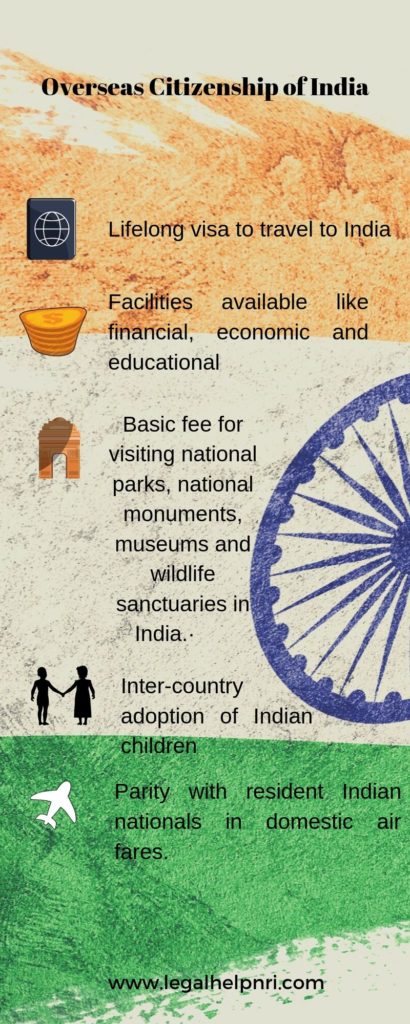 The (OCI)Overseas Citizenship of India is an immigration status which permitting a foreign citizen of Indian origin to work and live in the Republic of India. An Overseas Citizen of India is a licence to get the lifelong visa to travel flawlessly across India. The Overseas Citizenship of India was come into existence in response to the constant demands for “dual citizenship” particularly from the Diaspora and other developed countries. To keeping in view the Government’s commitment towards fulfilling the expectations and objective of Overseas Indians, the Overseas Citizenship of India Scheme was introduced by amending the Citizenship Act in August 2005. It was launched during the Pravasi Bharatiya Divas convention held in 2006 at Hyderabad. Most of the people mistakenly refer it as Dual citizenship. This Scheme has provide registration as Overseas Citizen of India of all who are Persons of Indian Origin and were citizens of India on 26th January, 1950 or at any time thereafter or migrated from India except those who is or had been a citizen of Bangladesh, Pakistan or such other countries as the Central Government has notified by notification in the Official Gazette, specify.
The (OCI)Overseas Citizenship of India is an immigration status which permitting a foreign citizen of Indian origin to work and live in the Republic of India. An Overseas Citizen of India is a licence to get the lifelong visa to travel flawlessly across India. The Overseas Citizenship of India was come into existence in response to the constant demands for “dual citizenship” particularly from the Diaspora and other developed countries. To keeping in view the Government’s commitment towards fulfilling the expectations and objective of Overseas Indians, the Overseas Citizenship of India Scheme was introduced by amending the Citizenship Act in August 2005. It was launched during the Pravasi Bharatiya Divas convention held in 2006 at Hyderabad. Most of the people mistakenly refer it as Dual citizenship. This Scheme has provide registration as Overseas Citizen of India of all who are Persons of Indian Origin and were citizens of India on 26th January, 1950 or at any time thereafter or migrated from India except those who is or had been a citizen of Bangladesh, Pakistan or such other countries as the Central Government has notified by notification in the Official Gazette, specify.
The OCI (Overseas Citizenship of India) is defined as:
- The person who formerly gave up Indian citizenship.
- The person whose grandparents or great grandparents or parents were once the citizen of India.
- The personwho is married to an existing India’s citizen or OCI and whose marriage registered for a continuous periodof least two years.
- The registered Overseas Citizens of India (OCI) shall not be entitled to the rights conferred on an Indian citizen under article 16 of the Constitution with respect to the equality of opportunity of public employment.
The registered Overseas Citizenof India (OCI) is granted multi-purpose, multiple entry, life-long visa for visiting India, and they are exempted from registration with Foreign Registration Officer or Foreign Regional Registration Officer for any time period of staying in India.
The Overseas Citizen of India (OCI) is also entitled to general parity with NRI’s (Non-Resident Indians)with regards to all facilities available to them in all filed like financial, economic and educational, except plantation properties or acquisition of agricultural. Any other future benefits/parity extended to OCI will be notified time to time by Ministry.The OCI card holder can travel India multiple times without visa.
They may become the citizen of India if they continue to retain OCI card for 5 years. But there is a condition that will be applied and the person would have to spend at least one year in India. But in this case short intervals are allowed.Immigration has separate check post counters for their speedy verification and entry.
For OCI holders separate visa for student and employment is not needed.
They can also open NRO, NRE account in Indian banks.
Parity with non-resident Indians in respect of
- Entry fee will be charged for visiting historical sites , national parks, national monuments, museums and wildlife sanctuaries in India.
- Practicing the professions of Doctors, dentists, nurses, pharmacists, advocates, Architects, Chartered Accountants in India.
- Inter-country adoption of Indian children.
Parity with resident Indian nationals in domestic air fares. They are entitled to appear for the All India Pre-Medical Test or such other tests to make them eligible for admission in pursuance of the provisions contained in the relevant Acts.
